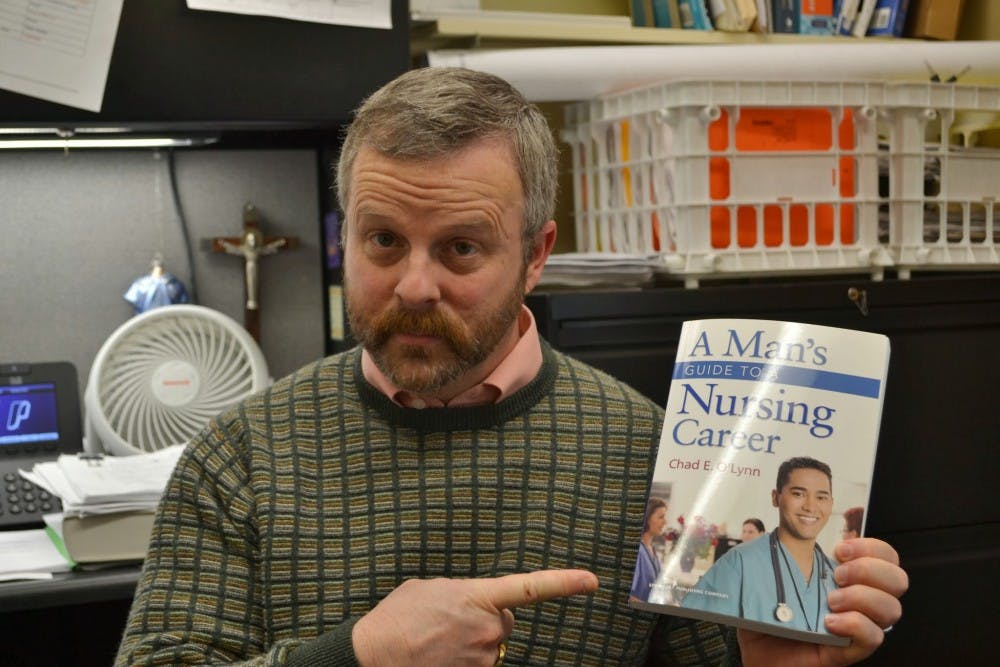Maggie Smet |
At UP, it’s a statistical likelihood to have a friend in the nursing program. Another statistic is more jarring. According to a study published in the Internet Journal of Allied Health Science and Practice, the nursing school dropout rate across the country at times approaches 100 percent for male students, compared to 46 percent for female students.
Nursing professor Chad O’Lynn, who studies the experiences of men in nursing, provides practical guidance to male nurses in his award winning book, “A Man’s Guide to Nursing.” O’Lynn wrote this book after receiving feedback for a more practical guidebook based on his first book he co-wrote as a scholarly review of the male nursing experience.
In “A Man’s Guide to Nursing,” O’Lynn offers advice to male nurses, from those thinking about the profession, to those struggling through nursing school, to graduates in their first job. It also offers role models of men in the nursing profession.
For some men, entering a historically female-dominated career is an exercise in recognizing that nursing is a profession open to all genders, especially with high dropout rates that may argue the opposite.
“Nursing school is tough for both men and women, but sometimes nursing school and the professors have old fashioned ideas, that (they) aren’t open to men, or in caring for people, women do it better than men, or that men shouldn’t be doing women health,” O’Lynn said. “These old fashioned ideas still have a place in nursing schools, fortunately not all nursing schools, and that’s starting to change, but all it takes is a couple of professors who give you a hard time and give you a negative experience.”
However, O’Lynn sees many ways the nursing profession is changing to be more inclusive, especially at UP. He points to the breakfast meeting for male students with the School of Nursing Dean and himself.
“The biggest thing is to have a real welcoming atmosphere, and I’m happy to say that I think that’s very present at the University of Portland,” O’Lynn said. “For the most part, the guys feel really welcomed, aren’t having any issues with their teachers or classmates for being men. We’re very happy in that regard.”
Junior nursing student Matt Gadbois sees the future of men in nursing as looking beyond difference, and towards normalizing all types of people in nursing. For him, gender has not affected the way he views nursing, or his role as a nurse.
“People always jump to the idea of ‘oh men and nursing - that’s great to have some tough guys around to carry things,’ I’m thinking like, I’m not going to school to lift heavy objects, I’m going to school to become a nurse. I’m going to be doing the exact same stuff as everyone else,” Gadbois said. “It kind of turns me off when people try to talk about what being in nursing means for me, but really they’re asking what it means to be in classes with all females, which I don’t care about, it doesn’t matter to me.”
Nursing professor Loretta Krautscheid agrees that while some male nurses may have challenges, the focus should be on inclusion and normalization.
“We certainly want to be inclusionary and not have somebody think that they shouldn’t even think about being a nurse just because of gender,” Krautscheid said. “We at the School of Nursing try to normalize all situations, no matter what it is, we’re less concerned about the gender and more concerned about ability, and making sure all of our nurses, regardless of gender, are prepared to take care of the physical, mental and spiritual well being of the person that they’re being entrusted to make better.”
O’Lynn’s book has won two awards, the Gene Tranbarger Award from the American Assembly for Men in Nursing, as well as an honorable mention from the American Association of Publisher’s PROSE awards for Professional and Scholarly Excellence.
Krautscheid sees O’Lynn’s book as an important step in addressing and acknowledging the concerns and problems some male nurses face.
“The most important thing is raising awareness among the general population of male and female nurses that there are these concerns that can come to the forefront and that we shouldn’t brush those aside,” Krautscheid said. “We need to address them objectively and see that people’s needs are met.”
Amidst the accolades, O’Lynn’s experience writing the book has lead him to some broader ideas about the importance and challenge of diversity.
“For a number of years, nursing has wanted a more diverse workforce, (including) more men and more minorities. But when it actually comes to walking the talk, it’s a little harder,” O’Lynn said. “I think that that really became clear to me as I wrote this book and talked to people and listened to their experiences. By and large, everyone wants to do the right thing, but it’s not always easy to do. ”








